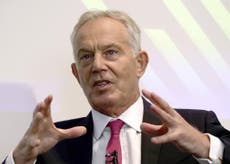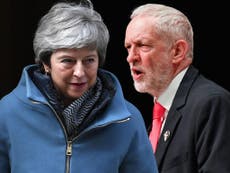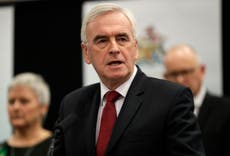McDonnell and Corbyn are both stepping away – but not without leaving an ideological successor behind
Any new party leader will need to give a different answer to the question: is Labour’s priority ideological purity, or winning power?

John McDonnell, the shadow chancellor, has confirmed that he will leave the Labour frontbench when Jeremy Corbyn stands down in the early months of next year. In staying on, possibly until April, rather than handing over to an interim leader, the party’s two most powerful figures hope to pave the way for a fellow left-winger to take over, so that Corbynism survives the departure of Corbyn.
McDonnell said: “There is a new generation coming through – Rebecca Long-Bailey, Angela Rayner, Richard Burgon. There’s a whole group of them.” He did not name-check potential candidates who appear not to enjoy the current leadership’s seal of approval – such as Sir Keir Starmer, Emily Thornberry, Lisa Nandy, Jess Phillips and David Lammy.
Corbyn allies are well-placed to help ensure that one of their own takes over. They have a majority on Labour’s national executive committee, which will set the timetable and oversee the contest among the party’s 500,000 members.
The Labour leader’s critics, including many former MPs who lost their seats last week, believe he should quit immediately. They suspect the inquest into Labour’s crushing defeat will pull its punches about his unpopularity if he remains at the helm while it takes place. Corbyn is still revered by many in his party; there will be a strong desire, as one of his allies put it, to “be nice to Jeremy”. Internal opponents are less forgiving. “They are like a religious cult,” one said.
Corbyn’s critics have a point when they accuse him of being in denial about the causes of Labour’s disaster. The party line to take was to blame it on Brexit, adding the inevitable attack on the mainstream media. Left-wingers had already rehearsed their lines about the hated mainstream media or “MSM” during the campaign, an insurance policy against defeat. Yes, much of the national press is biased against Labour; it was even more tribal than usual this time, because of the prospect of a socialist government. But the media did not cause Labour’s defeat, or lead millions of voters to conclude they did not want Corbyn to become prime minister.
Labour’s review might also stop short of criticising its election strategy under Corbyn. The party over-reached, targeting up to 150 seats it might gain, instead of defending its “red wall” of constituencies from north Wales to the northeast against Boris Johnson’s invasion. Team Corbyn is arguing that Labour’s manifesto was popular. Yet it was seen as a “kitchen sink” document that many voters judged not credible. “We lacked an overarching theme,” one pro-Corbyn MP admitted.
Thankfully, McDonnell showed a little more contrition than Corbyn, who so far has declined to take responsibility for defeat in the way Ed Miliband did after the 2015 election. McDonnell said Labour must listen and learn lessons, rightly pointing to the party’s decline over many years in its working class heartlands in the north and midlands. “I think it wasn’t just Brexit,” he said. “I think a long history of maybe 40 years of neglect and them saying to politicians, ‘You never listen to us and you have allowed our community to run down in this way.’”
McDonnell would probably favour his protege Long-Bailey, the shadow business secretary. Her prospects have been enhanced by the defeat in Thursday’s election of Laura Pidcock, who was favoured by some Corbyn allies.
With half an eye on the likely battle for the succession, Team Corbyn gave Long-Bailey, Rayner and Burgon a platform in TV election debates. In contrast, Starmer and Thornberry were virtually invisible in the campaign despite their senior shadow cabinet posts.
Long-Bailey and Rayner did well in their auditions. Both tick two important boxes. Labour will likely elect its first woman leader, and they hail from the north, where Labour’s fightback must begin.
They are friends as well as rivals, sharing a London flat. They might not run against each other, echoing Tony Blair and Gordon Brown. One might go for the vacant deputy leadership while the other runs for the top job. Rayner’s appeal would extend beyond the hard left. The likes of Starmer, Thornberry, Phillips and Nandy might struggle to woo the hard left.
Whoever takes over will face a daunting task, and probably a long haul. Unless they ensure Labour undertakes a proper reckoning after four successive defeats, the party will remain in the wilderness. Corbyn’s successor will also need to give a different answer to the question: is Labour’s priority ideological purity, or winning power?






Join our commenting forum
Join thought-provoking conversations, follow other Independent readers and see their replies